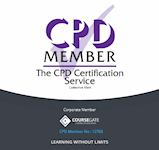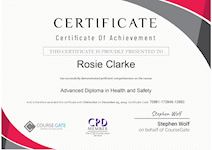Control and Administration of Medication - CPD Accredited
Exam Included . CPD Accredited Qualification . Lifetime access . Immediate Result
Course Gate
Summary
- Exam(s) / assessment(s) is included in price
- Tutor is available to students
Overview
The Control and Administration of Medication course are designed to help you understand the skills and knowledge required for working in healthcare settings. Learn to take care of drugs correctly and understanding how the right way of administering them can reduce both major and minor risks.
We understand the value of medication knowledge as it's essential for those working in the health and social care sector. The focus of this Control and Administration of Medication course to equip you with all the information required for the safe control, handling and administration of medicines in health and care settings.
This Control and Administration of Medication course covers the function of the medication administration, including how to prescribe, manage and supervise medicines safely. This Control and Administration of Medication course also explains the crucial legislation and direction correlating to the classification of medications, grasp Govt. policies and procedures for ensuring the safe handling of drugs, dispensing, receiving and verifying the validation of medicines, the significance of keeping accurate recording and much more.
On successful completion of the Control and Administration of Medication course, you will be able to expertly administer a range of medicines such as morphine, sedatives, laxatives and antibiotics, etc.
Learning Objectives
The primary learning objectives of the Control and Administration of Medication course are to:
- Provide an advanced understanding of the safe handling of medicines.
- Discuss the legislation of medication management.
- Introduce safe and appropriate practices for handling medicines.
- Provide an elaborate understanding of medication risk assessments.
- Guide you on how to handle medicines in social care settings.
- Teach the procedure for handling medication, whether you are at home or work.
- Discuss the six rights of medication administration, including recording procedures and the correct process of storing medication.
- Offer expert training to help you earn your Control and Administration of Medication certification.
CPD
Course media
Description
What will you learn in this Control and Administration of Medication
Module 1
In this module, you will learn all about Introduction to Safe Handling of Medicines. Medications are meant to make you well but, if they are not used appropriately, they can make you very sick. Medication safety is the correct storage, administration, and disposal of all medicines, to prevent inadvertent outcomes.
Module 2
In this module, you will learn all about Legislation and guidance of medication management. Medicines can be highly dangerous substances and as such must be carefully controlled. It is essential that only competent staff administer medications and that there are suitable in-house policies and procedures for the safe storage and use of all medicines in the home.
Module 3
In this module, you will learn all about the Principles of Safe and Appropriate Handling of Medicines. Today’s medicines are powerful compounds that control disease, ease discomfort and prolong life for millions of people and are generally beneficial. Unfortunately, no medicine is without side effects and some are worse than others. Side effects are not the only potential problem with medicines; sometimes people take medicines when they do not need them or use them in the wrong way or even take someone else’s medicines. Usually, these things happen by accident or because of misunderstandings. Often the consequences are mild but sometimes they can be severe or even life-threatening.
Module 4
In this module, you will learn all about Medication Risk Assessment Guidance. Risk assessment is the basis of good practice in the delivery of services. The potential service user along with their carers and all involved professionals should be actively involved in the process as sound risk assessment and the reduction of such risks in a systematic way improves the safety of all involved.
Module 5
In this module, you will learn all about Consent to Treatment.
Consent to treatment is the principle that a person must give permission before they receive any type of medical treatment, test or examination. This must be done on the basis of an explanation by a clinician. Consent from a patient is needed regardless of the procedure, whether it’s a physical examination, organ donation or something else.
Module 6
This module will teach you about Handling Medicines in Social Care Settings. When social care organisations look after medicines for the people they care for, the registered provider and the care service manager are jointly responsible for the safe and appropriate handling of medicines. They must ensure that there are written policies and procedures for every aspect of handling medicine and the registered provider is responsible for ensuring that when care workers give medicines they have the right training and are competent to do so.
Module 7
This module will teach you about Requirements for Specific Services. We have provided important information about handling medicines in the previous module. You need to check the specific requirements that apply for your care setting and for your home country. First of all, check what your care setting is registered for, as this determines the standards to which you have to work. Settings registered to deliver health care have to meet different standards from settings registered to provide social care. In the table below, we have included links to the websites of regulators in England, Scotland and Wales where you will be able to access relevant legislation and current national minimum standards.
Module 8
This module will teach you about Levels of Care and Support. Independent living staff may prompt, assist with or administer medication. The level of support needed by a customer should be clearly stated in their care plan. This includes prompting, assisting, administering.
Module 9
This module will teach you about the Procedure for Handling Medication. This policy incorporates safeguards for customers and staff and must be followed. It seeks to ensure that medicines are only administered to the person for whom they are prescribed, given in the right dose, at the right time by the right method/route.
Module 10
This module will teach you about The Six Rights of Medication Administration. Each time you give a medication, you must systematically and conscientiously check your procedure against these six rights. This is essential every time you administer any medication – including medications that an individual has been taking for a long time.
Method of Assessment:
Upon completion of the course, you will be required to sit for an online multiple-choice quiz based assessment, which will determine whether you have passed the course (60% pass mark). The test will be marked immediately and results will be published instantly.
Certification:
After successfully completing the course, you will be able to obtain the certificates. You can claim a PDF certificate by paying a little processing fee of £2. There is an additional fee to obtain a hardcopy certificate which is £9.
Who is this course for?
The Control and Administration of Medication course will be ideal for aspiring nurses, and other healthcare providers who require to know how to give you medication safely.
Career path
This Control and Administration of Medication course opens a new door for you to enter the relevant job market and also gives you the opportunity to acquire extensive knowledge along with required skills to become successful. You will be able to add our qualification to your CV/resume which will help you to stand out in the competitive job industry.
Questions and answers
Currently there are no Q&As for this course. Be the first to ask a question.
Reviews
Legal information
This course is advertised on reed.co.uk by the Course Provider, whose terms and conditions apply. Purchases are made directly from the Course Provider, and as such, content and materials are supplied by the Course Provider directly. Reed is acting as agent and not reseller in relation to this course. Reed's only responsibility is to facilitate your payment for the course. It is your responsibility to review and agree to the Course Provider's terms and conditions and satisfy yourself as to the suitability of the course you intend to purchase. Reed will not have any responsibility for the content of the course and/or associated materials.




